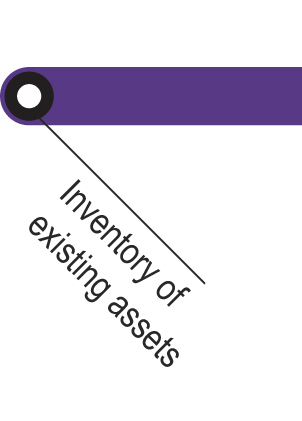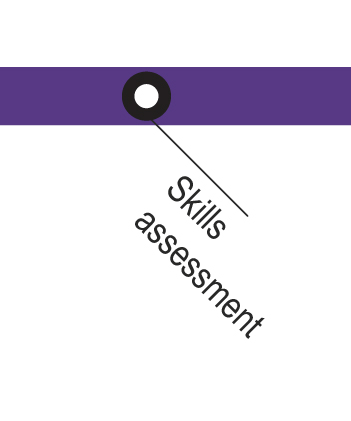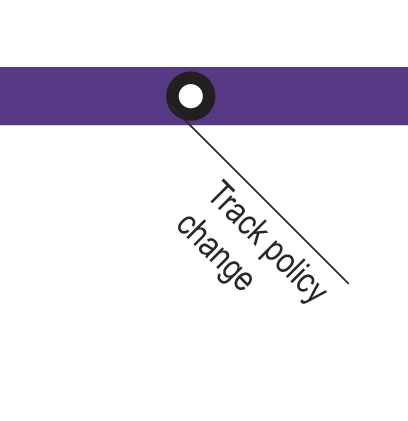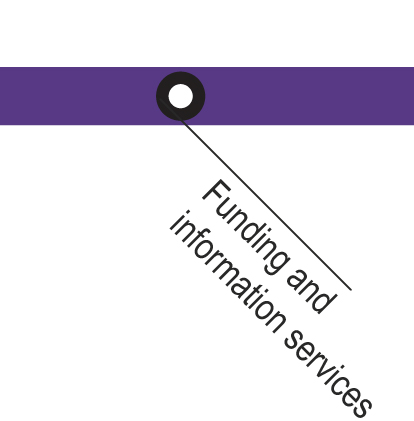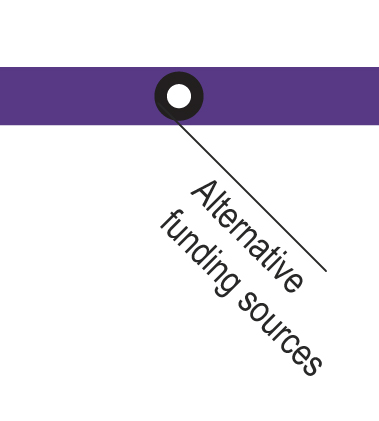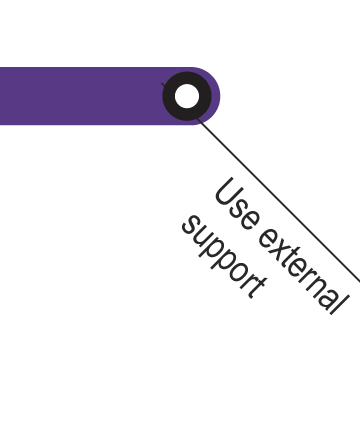The ASSESSMENT OF SKILLS AND CAPACITIES aims to establish wether the staff of your organisation has the skills and motivations necessary to do the relevant tasks involved in coordinating the search for funding and accessing resources.
 This task focuses on mapping the existing skills and capacities in your organisation that are related to project costing and the sourcing of funding. This exercise will enable you to identify any gaps and associated training needs.
This task focuses on mapping the existing skills and capacities in your organisation that are related to project costing and the sourcing of funding. This exercise will enable you to identify any gaps and associated training needs.
The relevant skills set includes skills relating to:
- project costing
- sourcing of funding
- writing funding applications
- coordination/project management
- co-creation, communication and relationship building.
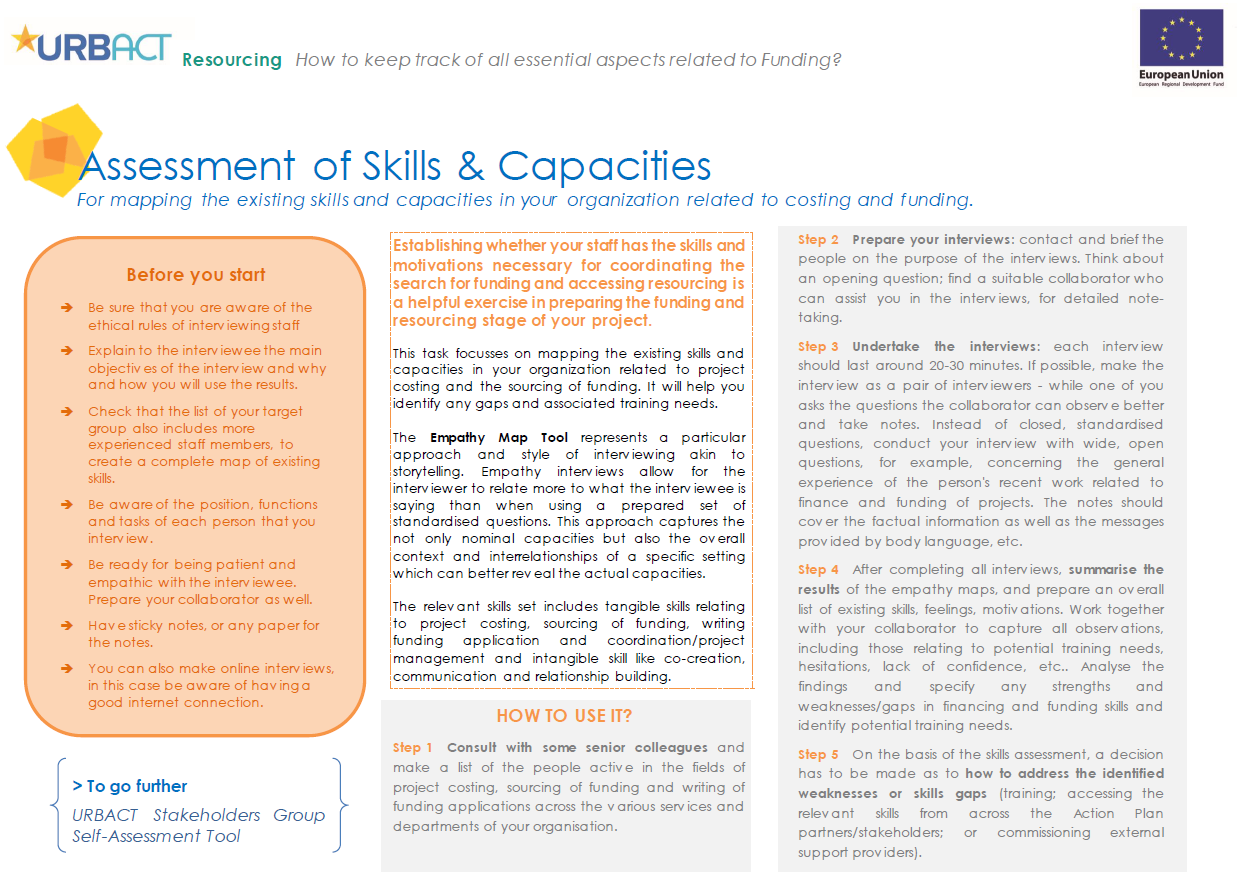 This activity will follow an empathy-based approach, which is mindful of potential sensitivities in the area of skills assessment, yet which provides at the same time a comprehensive overall picture of the factual capacities and needs as well as on the experiences and motivations of staff working in the area of project finance and funding. This will enable you to assess the actual level of skills in your organisation more accurately.
This activity will follow an empathy-based approach, which is mindful of potential sensitivities in the area of skills assessment, yet which provides at the same time a comprehensive overall picture of the factual capacities and needs as well as on the experiences and motivations of staff working in the area of project finance and funding. This will enable you to assess the actual level of skills in your organisation more accurately.
Who is the tool for? | When should the tool be used? |
The Coordinator of the Action Plan & relevant team members | Once the key topics relevant to your Action Plan have been identified, and when you have completed the inventory check on the assets of the organisation (Step 1/1). Before you start the potential creation of a Funding Coordination Team. |
Click on the stations to navigate through the Inventory line!
Key challenges of the step
- Talking about one's skills can be a sensitive subject for people depending on who they are talking to, how the subject is being discussed and who will be informed by the findings. This suggests a careful approach, such as the empathy interviews and potentially involving external interviewers.
- It could also be challenging to identify the target group, i.e. the members of staff whose skills will be assessed. This requires consultation with senior staff to ensure that the appropriate range of people is included in the interviews.
- Care needs to be taken as to who is best placed and skilled to take on the role of interviewer for the skills assessment.
- Deciding which approach to use: alternatives to empathy mapping include skills self-assessments, or commissioning the skills assessment to an independ external service provider.
- Handling any confidentiality issues: while the assurance of confidentiality ensures that an interviewee is potentially more honest about his or her actual skills and motivations, when skills gaps or training needs are identified, the confidentiality cannot be maintained easily in order to address the needs.
Main risk
The lack of empathy during interviews might lead to misleading or partial results and a potential misunderstanding of the motivations, competences and training needs of the persons involved.
Helpful tips
- Ensure that the interviewees understand fully the context of the skills assessment avoiding any fears or anxieties that they might be judged about their skills. This task is exclusively about identifying who could assist the various tasks involved in costing and finding funding for your plan and establishing if your organisation has the relevant skills for this.
- When using the empathy interview approach, keep the interviews focused and open at the same time. Always ask open questions (introduced by Why? How? When? etc.), and probe the interviewee whereby your questions should always refer to some elements that have been told by the interviewee. Use your questions for keeping the discussion focused on the topic of Funding and Sourcing skills, but don't follow a ready made list of questions. Pay particular attention on taking notes of the key messages given by the interviewee and do not over-explain or use leading questions. In an optimal case, two persons could do the interviews, one asking the questions and the other taking notes.
- Encourage your stakeholders to undertake the same exercise, so that you are aware of existing skills you might be able to tap into for support across your partnership.
- When analysing the findings, be mindful and think through the interview in detail, focusing on key words used and experiences shared by the interviewee. This provides valuable contextual information and will lead to a complete empathy map.
Further resources
Needs Analysis: How to determine training needs
- https://hr-guide.com/Training/Determining_Training_Needs.htm
Empathy Mapping
- https://webdesign.tutsplus.com/articles/techniques-of-empathy-interviews-in-design-thinking--cms-31219
- https://medium.com/@StaceyDyer/design-thinking-what-is-an-empathy-interview-25f71bd496d7

